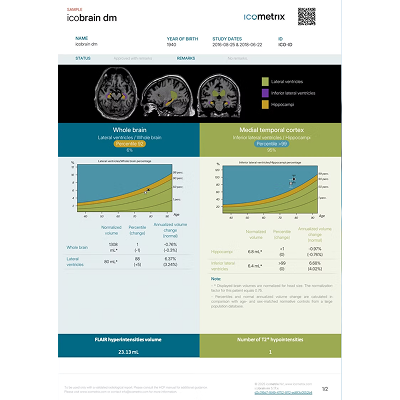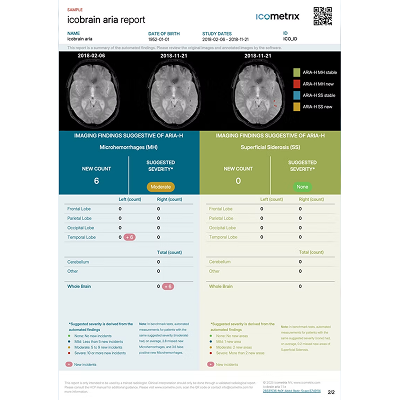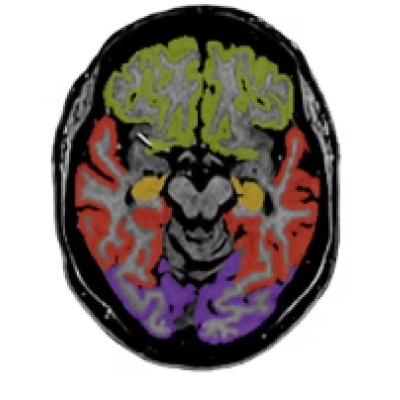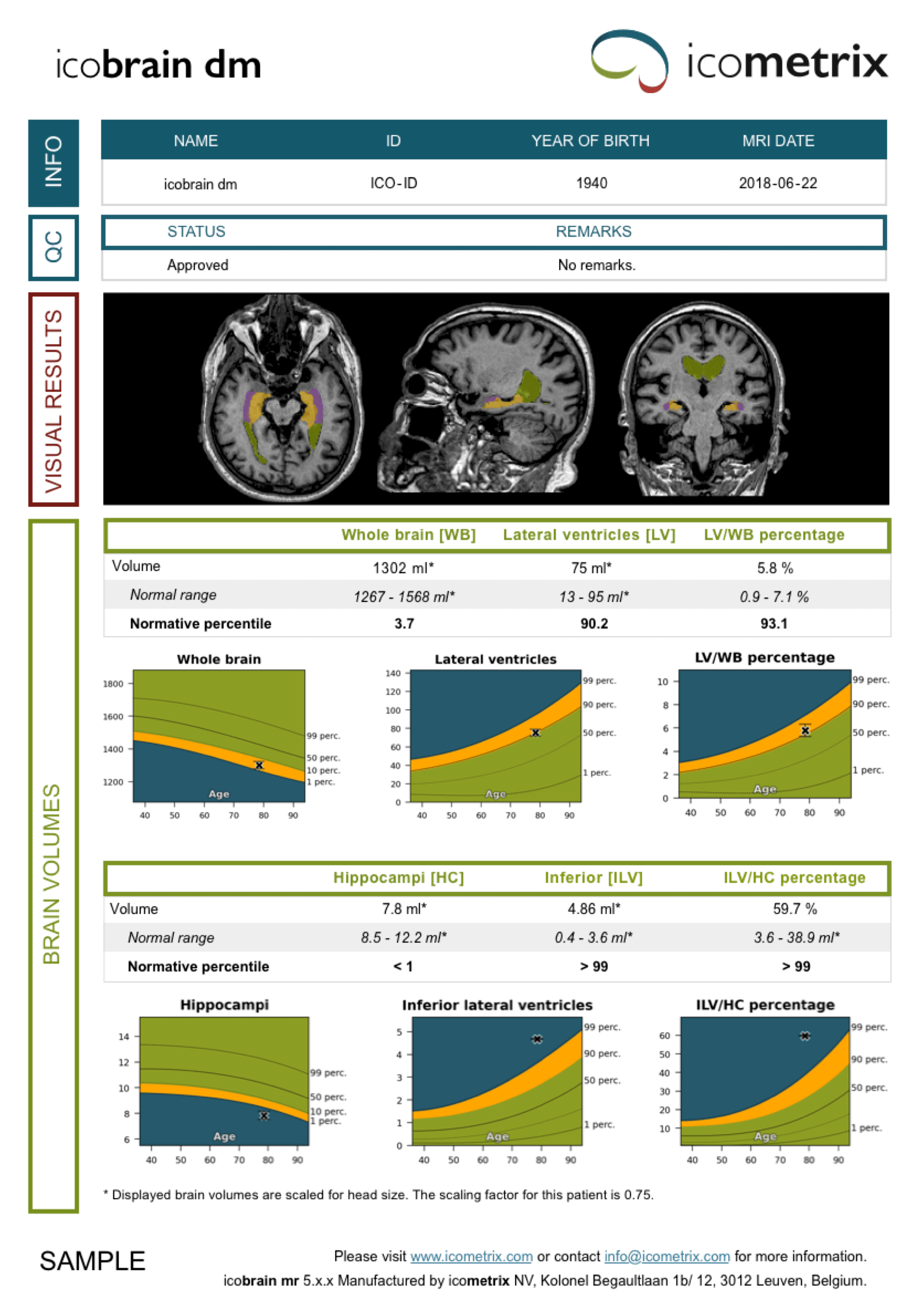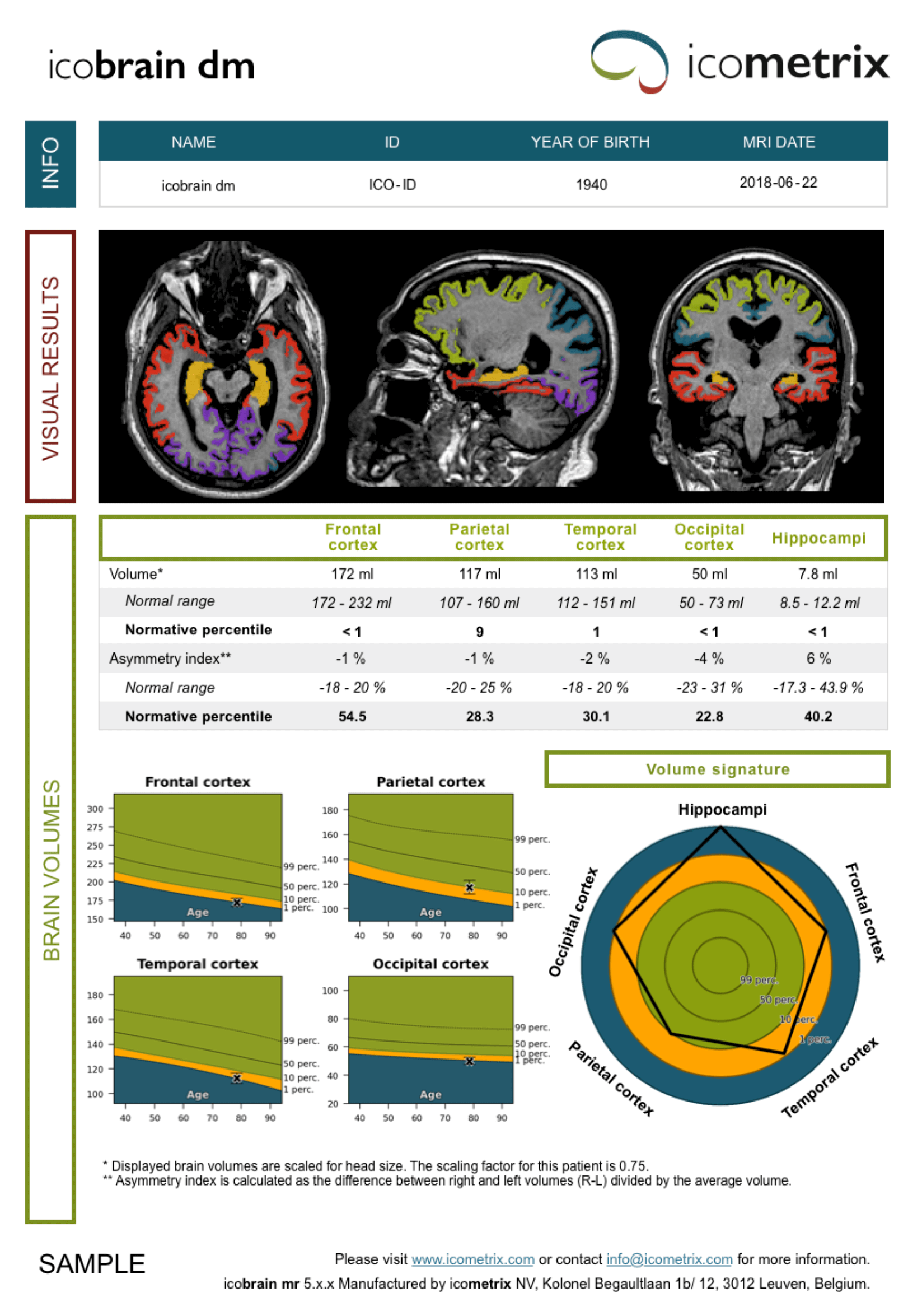Dementia and Alzheimer's
Supporting differential diagnosis and monitoring of atrophy in dementia
icobrain dm
icobrain dm is designed to support the early detection of markers of dementias, comparing whole brain and ventricular volumes to age- and sex-matched healthy controls.
icobrain dm can also used to assist radiologists and neurologists with the differential diagnosis of the particular type of dementia a patient may have, by providing individual volumes of the cortical lobes and hippocampi, and reporting percentiles compared to the age- and sex-matched healthy control population.
Additionally, icobrain dm can help radiologists and neurologists to evaluate eligibility for amyloid-targeting treatments for Alzheimer's disease, by reporting out the total volume of FLAIR white matter hyperintensities, as well as the number of T2* GRE hypointensities.
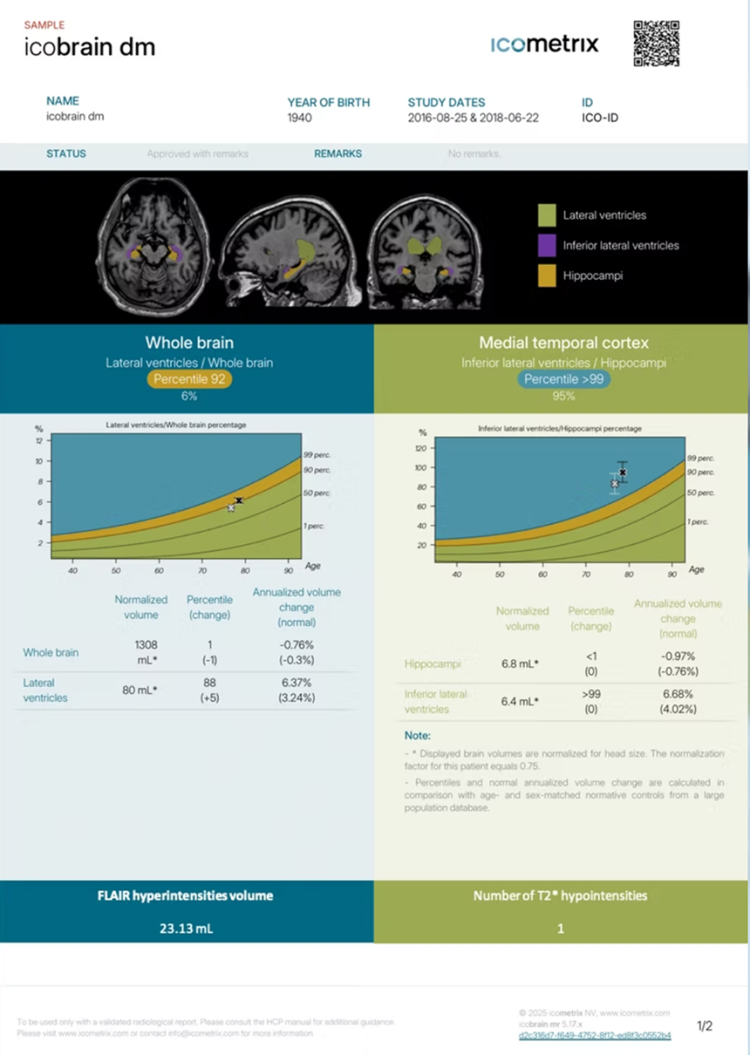
Dr. Johan Van Goethem on his experience with icobrain dm

icobrain aria
icobrain aria is used to assess side effects to amyloid-targeting therapies for Alzheimer's disease, known as amyloid-related imaging abnormalities (ARIA). It detects edema (gyral swelling and sulcal effusion), microhemorrhages, and superficial siderosis.
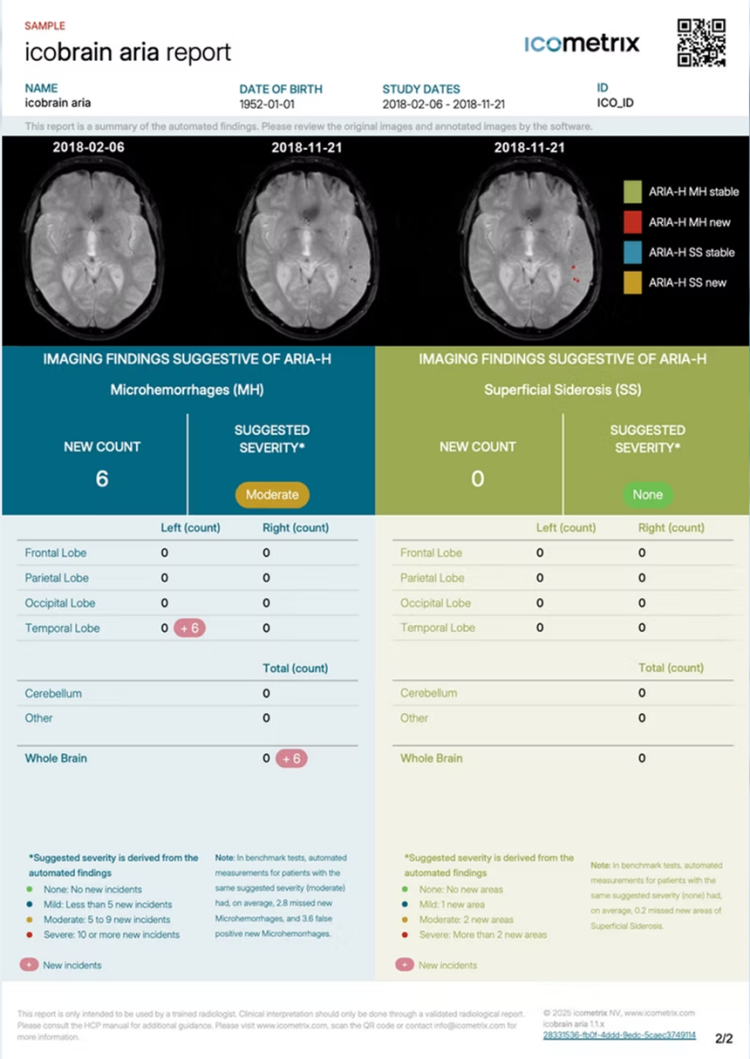
ARIA in Alzheimer’s Care - Insights from Experts at ECR2025

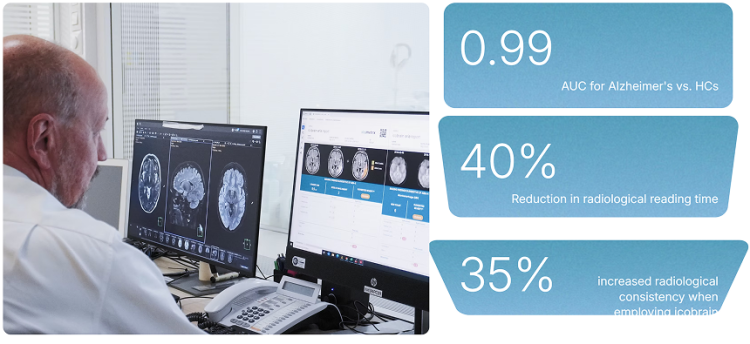
Key scientific publications
Independent validation and outlier analysis of EuroPOND alzheimer’s disease staging model using ADNI and real-world clinical data
Wittens et al. (2025)
Brain age as a biomarker for pathological versus healthy ageing – a REMEMBER study
Wittens et al. (2024)
A deep learning model for brain segmentation across pediatric and adult populations
Simarro et al. (2024)
Combining semi-quantitative rating and automated brain volumetry in MRI evaluation of patients with probable behavioural variant of fronto-temporal dementia: an added value for clinical practise?
Calloni et al. (2023)
Cost-Effectiveness Analysis of AI-Assisted Radiological Assessment in Patients With Relapsing Remitting Multiple Sclerosis in the UK
Esposito et al. (2022)
Inter- and Intra-Scanner Variability of Automated Brain Volumetry on Three Magnetic Resonance Imaging Systems in Alzheimer’s Disease and Controls
Wittens et al. (2021)
Diagnostic Performance of Automated MRI Volumetry by icobrain dm for Alzheimer's Disease in a Clinical Setting: A REMEMBER Study
Wittens et al. (2021)
Health Economic Impact of Software-Assisted Brain MRI on Therapeutic Decision-Making and Outcomes of Relapsing-Remitting Multiple Sclerosis Patients—A Microsimulation Study
Sima et al. (2021)
Towards validation in clinical routine: a comparative analysis of visual MTA ratings versus the automated ratio between inferior lateral ventricle and hippocampal volumes in Alzheimer’s disease diagnosis
Wittens et al. (2024)
Key scientific publications
Independent validation and outlier analysis of EuroPOND alzheimer’s disease staging model using ADNI and real-world clinical data
Wittens et al. (2025)
Brain age as a biomarker for pathological versus healthy ageing – a REMEMBER study
Wittens et al. (2024)
A deep learning model for brain segmentation across pediatric and adult populations
Simarro et al. (2024)
Combining semi-quantitative rating and automated brain volumetry in MRI evaluation of patients with probable behavioural variant of fronto-temporal dementia: an added value for clinical practise?
Calloni et al. (2023)
Cost-Effectiveness Analysis of AI-Assisted Radiological Assessment in Patients With Relapsing Remitting Multiple Sclerosis in the UK
Esposito et al. (2022)
Inter- and Intra-Scanner Variability of Automated Brain Volumetry on Three Magnetic Resonance Imaging Systems in Alzheimer’s Disease and Controls
Wittens et al. (2021)
Diagnostic Performance of Automated MRI Volumetry by icobrain dm for Alzheimer's Disease in a Clinical Setting: A REMEMBER Study
Wittens et al. (2021)
Health Economic Impact of Software-Assisted Brain MRI on Therapeutic Decision-Making and Outcomes of Relapsing-Remitting Multiple Sclerosis Patients—A Microsimulation Study
Sima et al. (2021)
Towards validation in clinical routine: a comparative analysis of visual MTA ratings versus the automated ratio between inferior lateral ventricle and hippocampal volumes in Alzheimer’s disease diagnosis
Wittens et al. (2024)
I feel like icobrain’s AI is better at diagnosing hippocampal loss compared to visual rating. Whilst with the volumetric report, we clearly see a hippocampal loss, we could not identify this by visual assessment (MTA-score)
I feel like icobrain’s AI is better at diagnosing hippocampal loss compared to visual rating. Whilst with the volumetric report, we clearly see a hippocampal loss, we could not identify this by visual assessment (MTA-score)
Geoffrey De Roeck, Radiologist at AZ Herentals
Like icobrain, brain biomarker measurements need to be extremely reproducible and sensitive enough to detect relevant clinical changes.
Like icobrain, brain biomarker measurements need to be extremely reproducible and sensitive enough to detect relevant clinical changes.
Max Wintermark, Radiologist at Stanford University

非常抱歉,您只有购买软件后才能查看完整软件教程!
